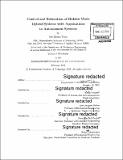| dc.contributor.advisor | Emilio Frazzoli. | en_US |
| dc.contributor.author | Yong, Sze Zheng | en_US |
| dc.contributor.other | Massachusetts Institute of Technology. Department of Mechanical Engineering. | en_US |
| dc.date.accessioned | 2016-07-01T18:43:36Z | |
| dc.date.available | 2016-07-01T18:43:36Z | |
| dc.date.copyright | 2016 | en_US |
| dc.date.issued | 2016 | en_US |
| dc.identifier.uri | http://hdl.handle.net/1721.1/103475 | |
| dc.description | Thesis: Ph. D., Massachusetts Institute of Technology, Department of Mechanical Engineering, 2016. | en_US |
| dc.description | Cataloged from PDF version of thesis. | en_US |
| dc.description | Includes bibliographical references (pages 203-213). | en_US |
| dc.description.abstract | Hybrid systems are a modeling framework that allows for the combined consideration of continuous and discrete state dynamics. They are described by a finite collection of continuous systems, with each of these continuous dynamics corresponding to discrete modes of operation. Hidden mode hybrid systems are the special case when the mode is unknown or hidden and mode transitions are autonomous. In addition, by allowing unknown inputs in this framework, both deterministic and stochastic disturbance inputs and noise signals can be considered. There are a large number of applications, such as autonomous systems with contact, urban transportation systems, human-automation systems as well as fault and attack identification in cyber-physical systems. However, the literature on feedback control and estimation approaches for such systems is rather sparse. The main contribution of this thesis is the development of fundamental theory and computationally efficient algorithms for feedback control and estimation of hidden mode hybrid systems. In the first part of the thesis, we consider the feedback control problem of hidden mode hybrid systems with input amplitude and rate constraints. We propose a single hidden mode control law that applies to all modes, as opposed to existing control designs in which a controller is designed for each mode and the switching between controllers are based on mode estimates. This technique was applied to the problems of dynamic landing of a helicopter and robot walking without ground contact sensors and to the control of a car with automatic transmission. In the second part of the thesis, we develop inference algorithms for simultaneously estimating states, unknown inputs and hidden modes of stochastic switched linear systems, along with an analysis of their properties. We first design simultaneous state and input estimators for a more general class of linear systems. Then, we make use of a multiple model framework to additionally estimate the hidden mode. These inference algorithms provide the initial steps towards the realization of smart vehicles that can infer the hidden intention of other drivers without explicit communication, as well as smart power grids with reliable estimates despite faults or malicious attacks on its topology, actuators and sensors. | en_US |
| dc.description.statementofresponsibility | by Sze Zheng Yong. | en_US |
| dc.format.extent | 213 pages | en_US |
| dc.language.iso | eng | en_US |
| dc.publisher | Massachusetts Institute of Technology | en_US |
| dc.rights | M.I.T. theses are protected by copyright. They may be viewed from this source for any purpose, but reproduction or distribution in any format is prohibited without written permission. See provided URL for inquiries about permission. | en_US |
| dc.rights.uri | http://dspace.mit.edu/handle/1721.1/7582 | en_US |
| dc.subject | Mechanical Engineering. | en_US |
| dc.title | Control and estimation of hidden mode hybrid systems with applications to autonomous systems | en_US |
| dc.type | Thesis | en_US |
| dc.description.degree | Ph. D. | en_US |
| dc.contributor.department | Massachusetts Institute of Technology. Department of Mechanical Engineering | |
| dc.identifier.oclc | 952342850 | en_US |
